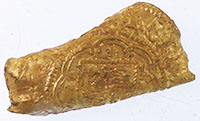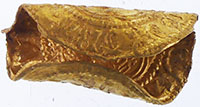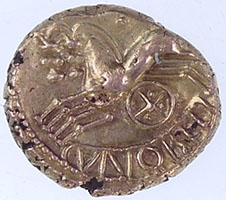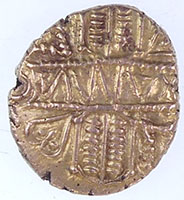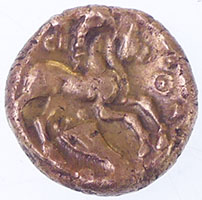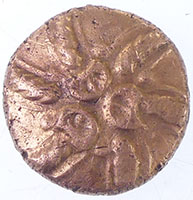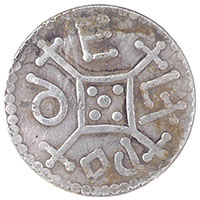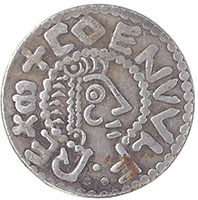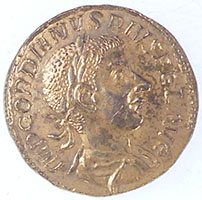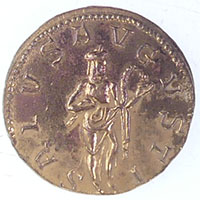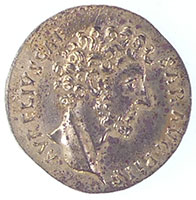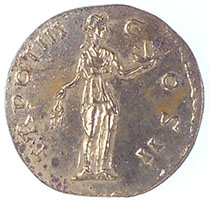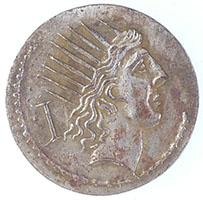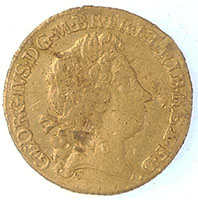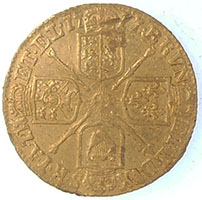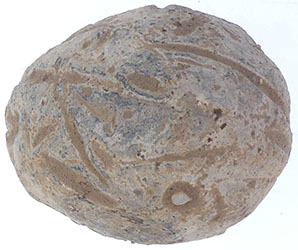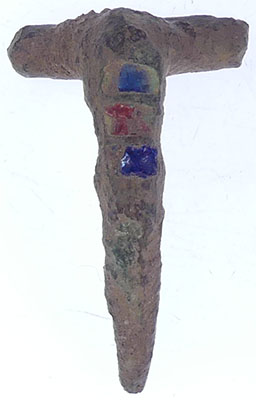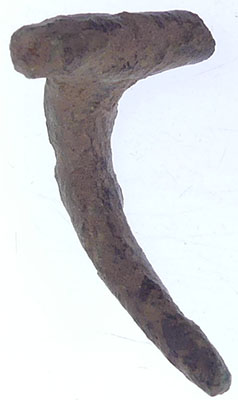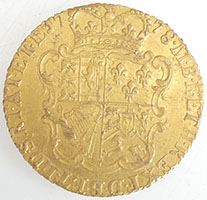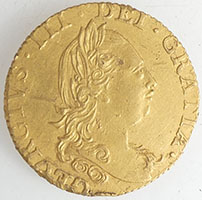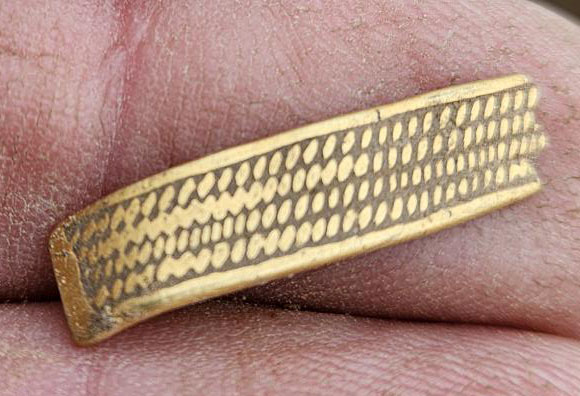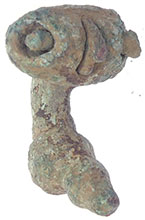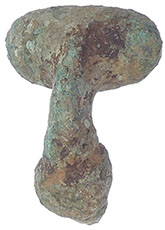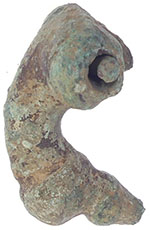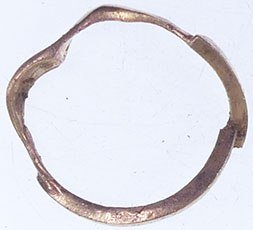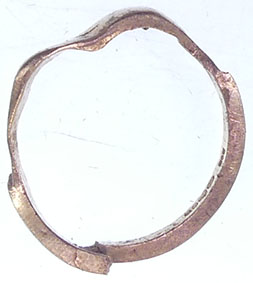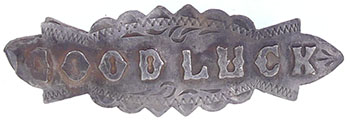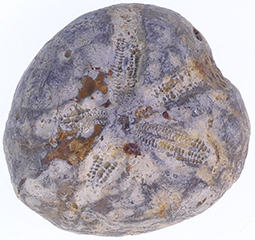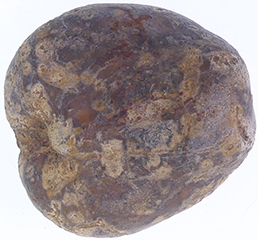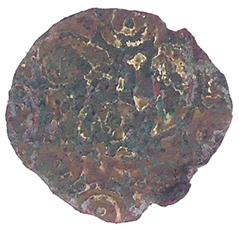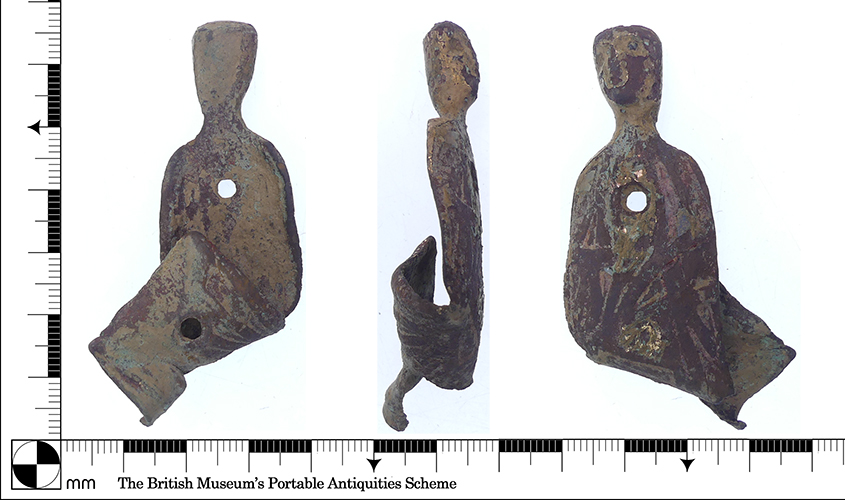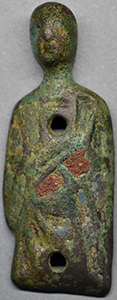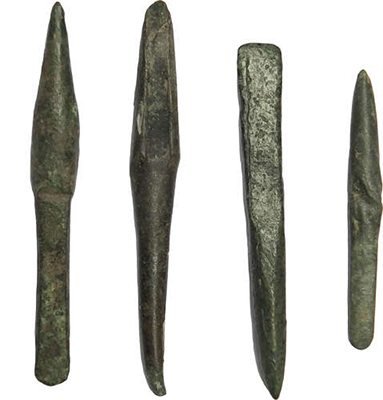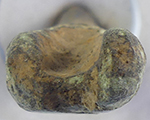

Metal detecting holidays in England with the World's most successful metal detecting club.20 years plus.
Twinned with Midwest Historical Research Society USA.
2024 April finds page |
1422 - 61 Henry VI hammered gold qtr noble - London - Lis mint mark Obv hENRIC DEI GRA REX ANGL Rev **REX A ** IV 1.735g, 19.83mm
|
|||
10-40 AD Cunobelin Celtic gold stater - biga type - reported to museum camvl in garnished tablet on vertical wreath, heart-shaped symbols in quarters, rev. biga left, leaf above, wheel and [cvnobelin] below (ABC 2771; 5.44g, 19.03mm
|
|||
  |
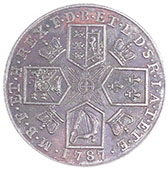 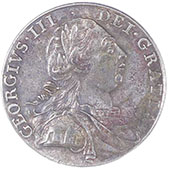 |
||
| c10thC Saxon stirrup mount - Type 9 human mask type | 1787 George III milled silver shilling modern forgery | ||
45 BC to 25BC Addedomarus - Trinovantian tribe - reported to museum Addedomarus (sometimes written Aθθedomarus on coins) was a king of south-eastern Britain in the late 1st century BC. His name is known only from his inscribed coins, the distribution of which seem to indicate that he was the ruler of the Trinovantes. 5.52g, 16.87mm |
|||
17thC silver bodkin needle - reported as treasure to museum |
|||
 |
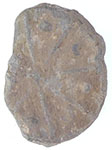 |
 |
|
| Large and small medieval bronze pot feet | 15thC lead token | 15thC lead token | |
 |
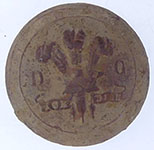 |
 |
|
| Post medieval cloth seal | 19thC Dragoon guards button | Georgian pastry jigger | |
 |
 |
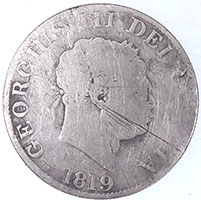  |
|
| 15thC lead token | 1819 George III milled half crown (30 pence) | ||
 |
 |
 |
|
| Huge Georgian key | 15thC lead token | Post medieval lead bale seal | |
 |
 |
  |
|
| 19thC livery button | Capt / Commander - 1774-1787 | Scotland Alexander II 1214-1249 hammered silver half penny Obv **AND ** Rev /RES - Moneyer Pierres of Rosburgh mint |
|
11,000 BC flint scraper |
|||
FAKES
|
|||
| More fakes found - this time a Saxon silver penny and 2 Roman gold and 7 silver coin - not funny whoever through this out in the field !!! | |||
1717 George 1st milled gold half guinea 4.16g, 20.84mm |
|||
 |
 |
  |
|
| 19thC livery button | 19thC livery button | 1817 George III milled silver sixpence | |
  |
  |
||
| 1923 George V milled silver florin (24 pence) | Medieval enamelled harness pendant | ||
Interesting Roman bronze nount - 30 cm long |
|||
  |
  |
||
1654 Theo Lambe of Colchester Essex hammered copper trade farthingSt Botolph's Gate neighbourhood AT BVTTIS GATE |
1593 Elizabeth 1st hammered silver sixpence | ||
  |
  |
||
| 1856 Victoria milled silver sixpence | 1940 George VI milled silver three pence | ||
  |
 |
 |
|
| 1847 Birmingham silver mount - Y date mark | 1900's Generic Merchant Navy Officers | Georgian cuff link | |
  |
 |
 |
|
1509-1526 Henry VIII hammered silver half penny - first coinage - double arched crown - portcullis mint mark -cross fourchee Obv HENRIC DI GRA AGL Z Rev CIVI/TAS/LON/DON - London mint |
18thC clog fastener | Georgian watch winder | |
 |
 |
|
|
| 17thC lead token | 17thC crotal bell | Huge medieval bronze pot leg | |
 |
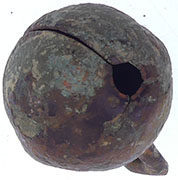 |
  |
|
| 16thC mount | 18thC crotal bell | 1590-2 Elizabeth 1st hammered silver half groat - Hand mint mark | |
  |
  |
||
| 1582-4 Elizabeth 1st hammered silver half groat - A mint mark | - A mint mark1461-1470 Edward IV hammered silver penny- D at centre of reverse cross | ||
  |
  |
||
1279 Edward 1st hammered silver penny Obv +EDWAR ANGL DNS hYB Rev CIVI/TAS/LON/DON - London mint |
1526-44 Henry VIII hammered silver penny Sovereign type London mint |
||
  |
  |
||
| 1914 George V milled silver three pence | 1816 George III milled silver sixpence | ||
  |
 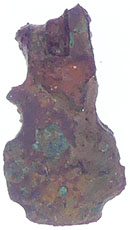 |
||
1422-1460 Henry VI hammered silver penny Cross-Pellet (York) Quatrefoil at centre of reverse cross |
Medieval enamelled harness pendant | ||
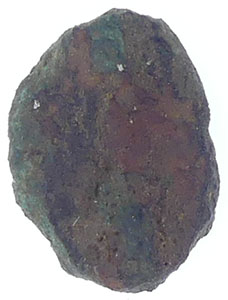 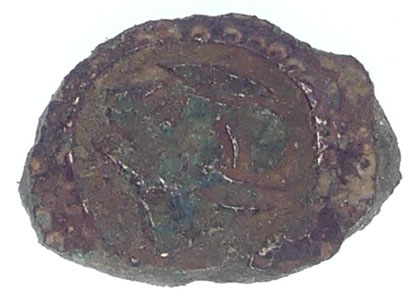 |
|||
| Roman enamelled disc brooch - looks like a bird facing right outlined in gold | |||
 |
 |
 |
 |
| Georgian key | 18thC crotal bell | 1500-1700 mount with two integral lugs | |
 |
 |
  |
|
| Georgian watch winders | 18thC clog fastener | 1565 Elizabeth 1st hammered silver half groat | |
  |
  |
||
| 17thC hammered copper trade farthing | 2nd Roman silver coin - needs 'cooking' to remove crust | ||
  |
 |
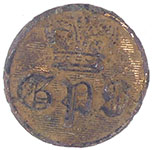 |
|
Rare rose each side with legend and no inner circles - only 2nd one I have seen dug 1625 Charles 1st hammered silver penny |
18th C Royal Navy silver button | Unknown GPS ? | |
  |
 |
 |
|
| 17thC William III milled silver sixpence | Victorian Essex Corporation button | WWII Royal fuseliers badge | |
 |
 |
 |
 |
| 16thC Tudor button | 16thC Tudor seal spoon handle | Georgian watch winder | Medieval hooked mount |
  |
 |
 |
|
1880-1890 John Robert Bedwell token Colchster EssexObverseLegend on five lines, the top and bottom curved. Lettering: ReverseLegend on five lines, the top three and bottom one curved. Lettering: |
Georgian buckle | Medieval vessel mount | |
 |
 |
 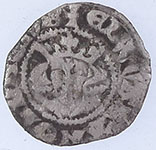 |
|
| 1500- 1700 buckle | Georgian Jews harp | 1279 Edward 1st hammered silver penny Obv EDWAR ANGL DNS hYB Rev CIVI/TAS/LOND/DON - London mint |
|
  |
  |
||
1356-61 Edward III hammered silver penny -Pre Treaty - annulet stops Obv +EDWA****A o NGLI Rev CIVI/TAS/***/RACI - York mint |
1842 Victoria milled silver four pence | ||
 |
 |
 |
|
| Medieval chaffing dish handle | 18thC clog fastener | 15thC lead token | |
  |
  |
||
| 1561 Elizabeth 1st hammered silver three pence | 1601 -2 Elizabeth 1st hammered silver half groat - 1 mint mark | ||
  |
  |
||
| 2ndC Roman silver coin - sent for ID | BC Roman silver coin - need 'cooking' to remove crust | ||
  |
  |
||
| Medieval pot leg | Series: Queen Charlotte ObverseHead of Queen Charlotte facing right. Script: Latin Lettering: H.M.G.M.QUEEN CHARLOTTE. ReverseScript: Latin Lettering: |
||
  |
  |
||
1770's twelve pence coin weight (1 shilling) D XII |
Post medieval cross brooch | ||
Huge Roman lead slingshot 56.8mm L x 43mm W, 570g, 1.3Lb
Smaller Roman lead slingshot 40.72 mm L x 32mm W, 232g, 0.5Lb |
|||
A Roman Lead Sling Bullet from the time of Julius Caesar, Late Roman Republic, ca. 46 BCE, Known to the Romans as "Glandes", lead shot used by slingers, such as this example, were accurate at ranges up to 600 feet. This example is from the Battle of Munde in 46 BCE where Julius Caesar defeated Pompey the Great. |
|||
 |
 |
 |
 |
| 17thC lead token | 1500-1700 mount - 2 integral lug | 17thC lead token | |
 |
 |
 |
 |
| 19thC livery button | Georgian mount | 19thC livery button | 17thC lead mount |
 |
 |
||
| 18thC toy cannon | 18thC lead toy cannon | ||
  |
 |
 |
|
| 1808 Louis Napoleon, King of Holland - Netherlands East Indies 1/16th of a Guilder | 19thC livery button | 16thC Tudor rose lead token | |
|
  |
||
1422-61 Henry VI hammered silver half penny - leaf on breast- satire stops - Leaf issue Obv hENRIC REXx A Rev CIVI/TAS/LON/DON - London mint |
1344- 1351 Edward III hammered silver penny - Florin type Obv +EDWAR R ANGL DNS YB Rev CIVI/TAS/LON/DON - London mint |
||
  |
  |
||
1279 Edward 1st hammered silver penny Obv +EDWAR ANGL DNS hYB Rev CIVI/TAS/LON/DON - London mint |
1649 Commonwealth hammered silver half groat | ||
Stunning 2nd C Roman fibular brooch - inlaid with coloured stones and enamel |
|||
 |
 |
  |
|
| 18thC silver Royal Navy button | Victorian silver thimble | 17thC Henry Lambe of Colchester hammered copper trade farthing | |
  |
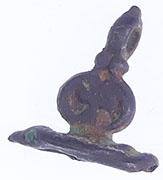 |
 |
|
1279 Edward 1st hammered silver penny - Class 4d cross with pellet of centre of reverse cross - pellet before CIVI Obv DW** REX x ANGL ** Rev CIVI/TAS/EBO/RACI - York mint |
Georgian fob seal holder | Georgian fob intaglio - head facing right | |
  |
  |
||
| 1855 Victoria milled silver sixpence | 1554 Mary hammered silver gorat fragment | ||
  |
  |
||
| 1816 George III milled silver shilling (12 pence) | 1247 Henry III hammered silver voided longcross farthing | ||
 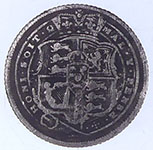 |
  |
||
| 1816 George III milled silver sixpence | 1344- 1351 Edward III hammered silver penny - Florin type Obv +EDWARDVS REX AIN Rev CIVI/TAS/DVN/ELM - Durham mint |
||
  |
  |
||
| Georgian watch winders | 1584-6 Elizabeth 1st hammered silver penny - Escallop mint mark | ||
 |
 |
 |
 |
| 1500-1700 mount | 19thC livery button | Victorian Eastern Railway button | 1500-1700 mount |
   |
  |
||
| Roman lead dice | Victoria milled silver 3 pence | ||
  |
  |
||
1279 Edward 1st hammered silver penny Obv +ED***DNS hYB Rev CIVI/TAS/LON/DON - London mint |
Gold plated finger ring | ||
  |
  |
||
| 1594-6 Elizabeth 1st hammered silver shilling - woolpack mint mark | Medieval hammered silver penny | ||
  |
 |
 |
|
1272 Edward 1st hammered silver penny Obv ** WAR ANGL *** Rev **VI/TAS/LO - London mint |
Georgian button | WWI Essex regiment cap badge | |
|
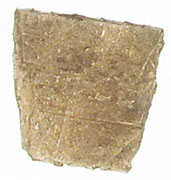 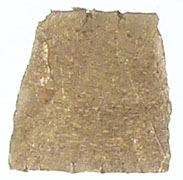 |
||
1247 Henry III hammered silver voided long cross penny- Class3 Obv *hENRICVS REX Rev HEN/RIO/NLV/NDE - Moneyer Henri of London mint |
Ancient gold sheet - 0.5g, 9.28mm L x 073mm T | ||
  |
  |
||
| 1861 Victoria milled silver three pence | 1603 James 1st 20 shilling coin weight XX |
||
 |
 |
 |
|
| Georgian watch winders | 17thC clasp | Georgian buckle | |
 |
 |
 |
 |
| 18thC crotal bell | 17thC lead token | 1900 Generic merchant seaman button | 18thC Royal Artillery button |
  |
  |
||
| 1779 Russian lead bale seal | 1247 Henry III hammered silver voided long cross farthing | ||
Mich Dave pops a 1778 George III milled gold half guinea 4.2 g, 20.5mm |
|||
  |
  |
||
1327 Edward 1st hammered silver penny- florin type Obv +EDWAR ANGL DNS hYB Rev VILL/***/***/NIE - Durham nint |
Georgian fob seal matrix | ||
 |
 |
 |
|
| Georgian watch winders | A complete cast copper alloy buckle of post-medieval date. The buckle is a double loop asymmetrical shape Circa 1575- 1700 |
17th C clothing fastner | |
 |
 |
 |
|
| Georgian spur buckle | Medieval cord end | 5- 1634 Charles 1st hammered copper rose farthings | |
 |
 |
  |
|
| 18thC Royyal Artillery button | One piece Navy buttons HONI SOIT QUI MAN Y PENSE PACKET Honi soit qui mal y pense (Old French: shame upon him who thinks evil of it) RN - Packet Service c.1800-1811 |
Medieval hammered silver farthing | |
Tom send me a picture from the field and he has found what looks like 1300 BC deorcated gold band - not played with it yet |
|||
  |
  |
||
| 1940 George VI milled silver three pence | Post medieval cast copper alloy two piece spur buckle C1650-1725 |
||
  |
  |
||
| 2ndC Roman bronze coin | 18thC shilling coin weight | ||
  |
  |
||
| 1634 Charles 1st hammered silver penny | German States 1 Schilling 1813 s-ss Friedrich Franz I. (1785 - 1837) Obv Crown FF Rev 1 Schilling Courant Mecklenb Schwerin Munze |
||
 |
 |
 |
 |
| Edwardian mount with blue stones | 16thC Tudor button | 1500-1700 buckle | 1500-1700 buckle |
 |
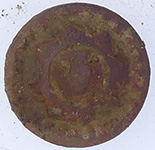 |
 |
 |
| 19thC livery button | Scots Fusilier Guards ( Scots Guards ) Officer - 1856-1877 |
WWII Royal Marines button | Georgian button |
 |
 |
  |
|
| Victorian Royal Engineers button | Queens crown mount | 18thC 5 shillings coin weight | |
 |
 |
  |
|
| Medieval mount | 1500-1700 mount | 2ndC Roman fibular brooch | |
  |
 |
|
|
| Plain silver ring - no hallmarks | Medieval lead trade weight | Georgian watch winders | |
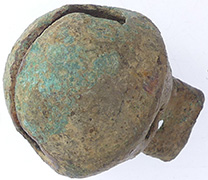 |
 |
  |
|
| 18th crotal bell | 1500-1700 mount | 1855 Victoria milled silver sixpence | |
   |
|||
| 1881 silver finger ring - full hall marks - Maker S&c | |||
  |
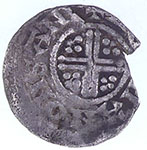  |
||
Medieval hammered silver penny - Continental imitation , E(a) Sterling type Obv +E******SCONE**ES Rev NON/***/OVA |
1204- 1207 John hammered silver short cross penny - Class 5b Obv +hENRICVS REX Rev ** AN ON SAND - Moneyer Iohan of Bury St Edmunds |
||
  |
  |
||
| 1891 Victoria milled silver sixpence | 1816 George III milled silver sixpence | ||
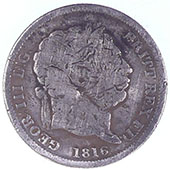  |
  |
||
| 1816 George III milled silver shilling | 1816 George III milled silver sixpence | ||
 |
 |
  |
|
| 1500-1700 mount | Georgian buckle | 1858 USA Flying Eagle copper coin | |
  |
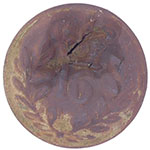 |
 |
|
| Medieval heraldic enamelled shield pendant | 16th Regiment of foot O/R's - 1855-1881 |
Society of Ancient Britons The Honourable and Loyal Society of Ancient Britons in existant from 1715 until the end of the 81th century |
|
  |
|||
| 1922 George V milled silver sixpence comparison to 1915 George V milled silver shilling (12 pence) | |||
  |
  |
||
| 1500-1700 hooked mount | 17thC William III hammered silver | ||
  |
  |
||
| 1587-9 Elizabeth 1st hammered silver half groat -Crescent mint mark | 16thC Elizabeth 1st hammered silver half groat | ||
 |
  |
||
| Victorian Gold plated signet ring | 1816 George III milled sixpence | ||
  |
|||
| Georgian seal matrrix ring | |||
 |
 |
  |
|
| Georgian trade weight - London mark | 17thC lead token | 1839 Victoria milled silver three pence | |
 |
 |
 |
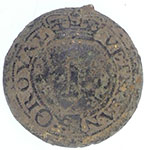 |
| 15th lead token | Georgian lead tobacco jar lid handle | WWII Royal Atrillery sweet heart badge | Royal Veteran Battalion Description: The No. 1 around written 'Royal Veteran' surmounted by crown Category: Regular Troops; Metal: Copper Alloy Date: 1802-1817 |
  |
  |
||
| 1560-1 Elizabeth 1st hammered silver penny - Cross crosslet mint mark | 1422 -61 Henry VI hammered silver half penny - roundabout Initial cross- pellets by crown - satire stops Possible leaf issue Obv HENRIC REX ANGLI Rev CIVI/TAS/LON/DON - London mint |
||
  |
 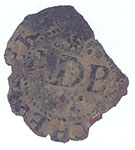 |
||
| 1856 Victoria milled silver three pence | 1666 John Debart of Colchester , clothworkers hammered copper trade farthing | ||
 |
 |
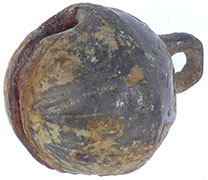 |
 |
| Georgian spur buckle | 17thC lead trade weight | 18thC crotal bell | Georgian watch winder |
Thick solid silver bracelet - marked Italy .925 |
|||
 |
 |
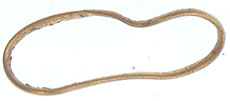  |
|
| 17thC clothing fastener | Georgian silver mount | Pure gold finger ring - 0.77g, 23.16mm- no hall marks | |
2nd Roman trumpet fibular brooch |
|||
  |
 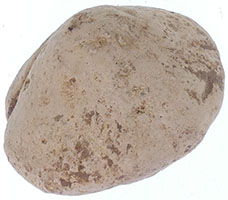 |
||
| 1216 Henry III short cross hammered silver half penny | Medieval steelyard trade weight | ||
 |
 |
  |
|
| Georgian pastry jigger | Georgian watch winders | Rare 1768 dated lead token | |
  |
  |
||
| 20thC alloy crucifix | 1876 German copper coin - German Reich Empire 2 Pfennig | ||
  |
 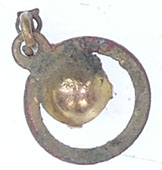 |
||
| Victorian tie pin | Plated jewelly item with glass stone | ||
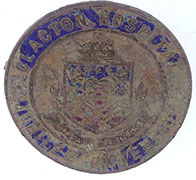 |
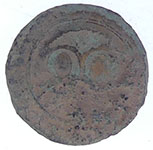 |
|
|
| Clacton Hospital Jubilee Extension commemorative badge c1935 | Unknown 90th Regiment of foot button Date: c1820-1840 |
1999 - 9 carat Gold ring -1.394g, 21.93mm - Birmingham hall mark - 0.375 - date letter Z | |
  |
 |
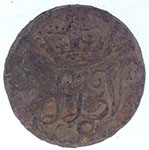 |
|
| 1816 George III milled silver sixpence | Georgian button | Military volunteer regiment ? FLV |
|
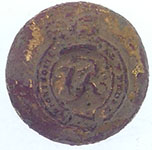 |
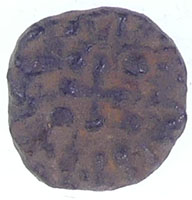 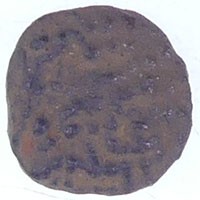 |
||
| Victorian Royal Engineers button | Primary 600AD Saxon silver sceat 1.27g,12.15mm |
||
Spectacularly crafted multi stranded BC gold band - reported to museum as treasure 1.19g, 21.6mm L x 5.83mm W x 1.1 mm T
|
|||
 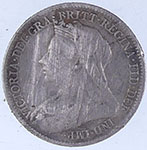 |
  |
||
| 1899 Victoria milled silver sixpence | Medieval lead mount | ||
  |
 |
 |
|
| 19THc Victoria milled silver threepence | Victorian Oz trade weight | Victorian silver pig charm | |
  |
  |
||
| 17thC William III milled silver sixpence - love token | 1920 George V milled silver sixpence | ||
 |
 |
 |
|
| 15thC lead token | Medieval lead token | Georgian watch winders | |
 |
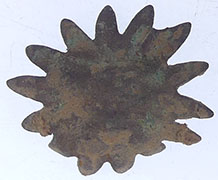 |
  |
|
| 19thC buckle | 1500-1700 mount | 1279 Edward III milled silver penny | |
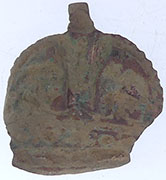 |
 |
 |
 |
| Victorian crown badge | Georgian lead tobacco jar lid handle | 1500-1700 mount | Georgian pipe tamper |
  |
  |
||
| 1649 Commonwealth hammered silver half groat | 16thC Elizabeth 1st hammered silver penny | ||
  |
 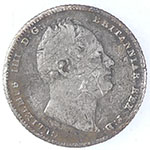 |
||
| 1838 Victoria milled silver three pence | 1834 William IV milled silver sixpence | ||
  |
  |
||
| 18thC clog fastener | Post medieval hammered silver half groat | ||
  |
|||
| Victorian fish knife | |||
  |
  |
||
| 1679 Charles II milled silver two pence | London, Charles Williams, clothier
Obv: CHARLES WILLIAMS THE BEST ONE SOVEREIGN OVERCOAT IN LONDON. 169 HIGH ST BOROUGH , in seven lines, first and last two curved. Rev: CHARLES WILLIAMS , curved above his bearded bust left, 169 HIGH ST BOROUGH , curved below. |
||
 |
  |
||
| Medieval strap end | Georgian fob seal decoration | ||
 |
 |
|
|
| French Infantry Button 51st Line Regiment Circa 1803-1814 |
15thC lead token | Post medieval strap end | |
  |
  |
||
| 1836 William IV milled silver half crown (30 pence) | 1836 William IV milled silver four pence | ||
 |
  |
||
| Size comparison William IV milled silver half crown v 4 pence | 1279 Edward 1st hammered silver penny Rev CIVI/TAS/DVR - Durham mint |
||
  |
  |
||
| 1247 Henry III hammered silver voided long cross half penny | 1582 Elizabeth 1st hammered islver sixpence - sword mint mark | ||
  |
  |
||
1764 1/12 Thaler German States Silver -Principality of Brunswick ObversePrancing horse on the left, legend around. Script: Latin Lettering: ReverseName and date in the center, legend around. Script: Latin Lettering:
|
1634 Charles 1st hammered silver penny | ||
  |
  |
||
| 18thC silver clog fastener - Maker IS | 2nd C Roman silver coin sent for ID | ||
  |
  |
||
| 1896 Victoria milled silver sixpence | 15thC Angel coin coin weight - bent right leg Circa 1493 - British | ||
  |
  |
||
| 1817 George III milled silver sixpence | Medieval enamelled heraldic mount - looks like a spur fitting - red and gilding remains | ||
 |
 |
  |
|
| 18thC Royal Navy silver button | 1500-1700 mount | 1818 Geoege III milled silver shilling | |
  |
  |
||
| Medieval hammered silver long cross penny | 1819 Geoege III milled silver shilling | ||
 |
 |
 |
 |
| Victorian brooch | 1500-1700 mount | RN Capt / Commander - 1812 | 19thC mount - Blackmore head |
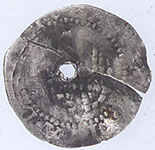  |
 |
 |
|
| 1603 James 1st hammered silver penny | WWII Royal Air Force badge | 18thC tpy cannon | |
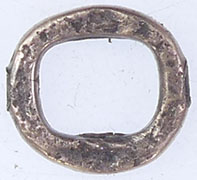 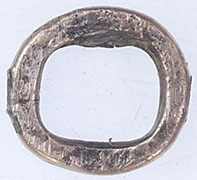 |
  |
||
| Rose gold jewelry item | 1603 James 1st hammered silver half groat | ||
  |
  |
||
| 1594-6 Elizabeth 1st hammered silver half penny | 1696 William III milled silver sixpence | ||
 |
  |
||
| 1920's bone handled pen knife | Medieval strap end | ||
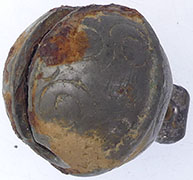 |
 |
  |
|
| 18thC crotal bell | Great Britain: Weight of Musket BallsLead wall piece lead ball - large calibra 105g, 22mm (1/4Lb) 0.88inch |
Roamn silver coin fragment | |
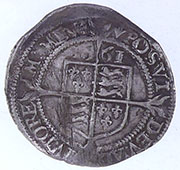  |
  |
||
| 1561 Elizabeth 1st hammered silver three pence | 1247 Henry III hammered silver voided long cross farthing | ||
  |
  |
||
| 1854 Victoria milled silver three pence | Irish 1461- 1470 Edward IV hammered silver penny 2 pellets by neck |
||
1stC BC Cunobelin Celtic silver coin - 'cooking' it to remove crust C4 (M215, V2045, BMC 1863-65) Obv. head 1., spiky hair floating behind head. Variety with pointed ?bearded chin has CAM in front, VL behind head; others with less pointed chin have CAMV or CAMVL in front. Pellet border. Rev. seated Victory r., holding bowl in outstretched r. hand. Pellet in ring in front. CVNO below exergual line. Pellet border. |
|||
  |
 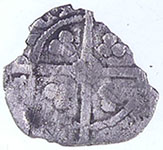 |
||
1279 Edward 1st hammered silver penny Obv +EDWA*** DNS hYB Rev CIVI/TAS/CAN/T** -Canterbury mint |
1422-1460 HenryVI hammered s ilver penny- Quatrefoil with cross on centre of reverse cross Rev RACI - York mint |
||
  |
  |
||
| 1587-9 Elizabeth 1st hammered silver penny - Crescent mint mark | 1644 Charles 1st hammered silver half groat - mullet mint mark - Oxford | ||
  |
  |
||
| 1573-4 Elizabeth 1st hammered silver sixpence - Acorn mint mark | 1247 Henry III hammered silver voided long cross farthing | ||
  |
 |
 |
|
| Tiny Roman bronze minim | 19thC livery button | 16thC Tudor mount | |
  |
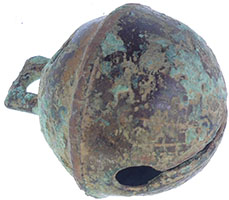 |
 |
|
| Victorian Billingsgate Fish Market London token | 18thhC crotal bell | 19thC livery button | |
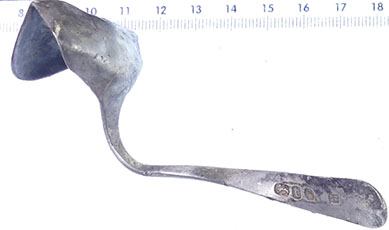 |
|
||
1794 Silver spoon - London mint - duty paid bust sysmbol daye letter t Marker PB AB Peter & Ann Bateman Basket, creamer, cruet, decanter label, flatware, mustard, salt, tea caddy, teapot 1790..1799 |
Medievalhandle mount | ||
  |
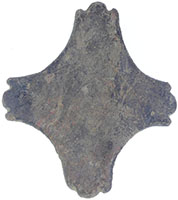 |
||
| Georgian decorated pipe bowl | 1500-1700 mount | ||
  |
  |
||
| Medieval strap end | 1670 Charles II milled silver penny | ||
|
 |
||
| 17thC silver bodkin needle - reported ast treasure to museum | Georgiab watch winders | ||
 |
 |
  |
|
| Victroian corporation button | 18thC Royal Navy cufflink | 1553- 86 AD Hans Schultes I ‘Lion of St Mark’ Jetton obv Lion of St mark standing left, nimbate and winged, holding book of the Gospels in right fore paw: Lions halo orjecting into the margin and surmounted by a cross + SANT:MARGVS:NORPED Rev Imperial orb surmouned by cross patty HANS rosette SCHVTLTES rosette NORNBE Ref Mitchiner 1382 |
|
  |
  |
||
| 1634 Chalres 1st hammered silver penny | Unknown hinged handle | ||
 |
 |
 |
|
| Medieval chaffing dish handle | 15thC lead token | Georgian pendant | |
  |
  |
||
| Roman silver coin - need cooking to remove crust | 1770's 6 shilling and 9 pence coin weight S6 9D |
||
 |
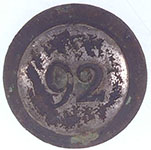 |
  |
|
| Medieval buckle | THE 92nd REGIMENT OF FOOT Description: 92 within plain inner circle. Category: Regular Army; Type of button: Convex 15mm ; Metal: Copper Alloy silvered; Backmark: EXTRA STRONG PLATED Date: c1820-1840
|
19thC printing press block | |
  |
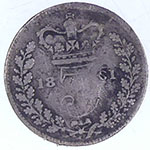  |
||
| 1845 Victoria milled silver shilling | 1861 Victoria milled silver three pence | ||
  |
 |
 |
|
| 1818 George III milled silver sixpence | 1500-1650 buckle | 17thC clothing fastener | |
|
 |
 |
|
| Victorian 'Goodluck' silver brooch | Medieval mount | 19thC livery button | |
  |
  |
||
| 1836 William IV milled silver four pence | |||
  |
  |
||
| 1885 Victoria milled silver sixpenced | Posat mediecal lea bale seal | ||
 |
 |
  |
|
HONI SOIT QUI MAN Y PENSE PACKET Honi soit qui mal y pense (Old French: shame upon him who thinks evil of it) RN - Packet Service c.1800-1811 |
17thC lead mount | Victorian model penny Joseph Moore was a noted Birmingham medallist (1817 - 1892) who trained under Halliday. He was then in partnership as Allen & Moore (1840 - 1858) and the A&M initials are on many pieces of this period. From 1859 onwards he was trading in his own name with the Moore business eventually being acquired by Fattorini & Sons in 1920. In 1844 Moore produced models (patterns) of a bimetallic penny as a suggestion for a change in the currency of the realm by using lighter and smaller coins than the much heavier and larger "cartwheels" then still in general use. Later, in 1847 / 1848 Moore's firm produced a range of model pieces ranging from 1/16th of a farthing (6mm diameter) through to the bimetallic half pennies and pennies and up to the very ornate crowns, also bimetallic, and quarter sovereigns. The lower denominations were very small and not actual currency in force in the UK either at that time, or before or since. The smaller pieces were probably produced to enhance his own expertise and to market the larger pieces and they have readily become collectable today as "Model Coins". The bimetallic pennies - still seen in abundance today - were so popular with the general public that the Royal Mint had to make an official announcement that they were not legal tender. Moore meant them to be serious models for consideration as currency and most have "Model" on them which probably saved Moore from prosecution under the Counterfeit Laws. |
|
  |
 |
 |
|
| 1844 Victroria milled silver sixpence | Georgian buckle | 15th lead token | |
  |
 |
 |
|
1247 Henry III hammered silver voided long cross half penny Moneyer Nicole |
18thC bayonet frog | Button with castle | |
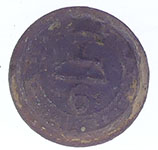 |
 |
|
|
THE 6TH REGIMENT OF FOOT. / After 1881 :- Royal Warwickshire Regiment Description: Antelope over 6 within garter with motto surmounted by crown . Category: Regular Army; Type of button: Convex 19.5mm ; Metal: Copper Alloy, silver plated; Backmark: LEWIS INKSON LONDON ; Date: c1810-c1820 |
Capt / Commander - 1774-1787 RN Master & Mate - 1787-1807 RN Surgeon - 1787-1805 |
Georgian watch winders | |
 |
 |
 |
 |
| 18thC crotal bell | Post medieval lead bale seal | 15thC lead token | 18thC silver navy button |
 |
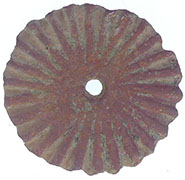 |
 |
 |
| Medieval chaffing disc handle | Georgian pastry jigger | 1500-1700 mount | 1855 on - Coldstream guards button |
 |
 |
 |
 |
Description:Lion on ground over IV with legend KINGS OWN Regiment around. Category: Regular Army; Type of button: Convex 20mm ; Metal: Gold plated. Backmark:None; Date: c1790-c1800 |
Unknown military button | 19thC Customs button | 17thC clothing fastener |
 |
 |
 |
 |
| 15thC lead token | Capt / Commander - 1774-1787 RN Master & Mate - 1787-1807 RN Surgeon - 1787-1805 |
WWII Essex Regiment lapel badge | 18thC clog fastener |
 |
 |
  |
|
| 1500 -1700 buckle | 18thC clog fastener | 1759 Dutch copper coin Zelandia | |
  |
 |
 |
|
| 2ndC head type Roman fibular brooch | Georgian buckle | 19thC livery button | |
  |
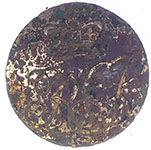 |
 |
|
| 1216 Henry III hammered silver short cross half penny | RCI which is Royal Chelsea Infirmary. Royal Corp of Invalids As a result the men were often poorly clothed until the hospital was ordered to provide funding from October 1704. The 21st-century uniform of the Chelsea Pensioners maintains the link with the corps, with the buttons showing the initials "RCI" for the Royal Corps of Invalids. |
Georgian padlock | |
 |
 |
 |
 |
| Victorian cnadle holder handle | Georgian harness buckle | 1500-1700 mount | 15thC lead token |
  |
  |
||
| 1902 Edward VII milled silver shilling | 1825 George IV milled silver shilling | ||
  |
  |
||
| 1247 Henry III hammered silver voideded longcross farthing | 1865 Victoria milled silver sixpence | ||
  |
  |
||
| 1860 Victoria milled silver sixpence | 1865 Victoria milled silver sixpence | ||
  |
  |
||
| 1844 Victoria milled silver sixpence | 1936 George V milled silver sixpence | ||
  |
|||
| Medieval handle mount | |||
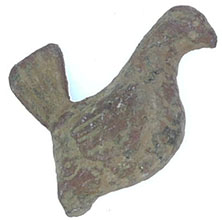   |
|||
| Roman mount | |||
  |
|
||
| Medieval hanging bird pendant | Medieval bronze knife handle | ||
450 million year old fossils Sea Urchin EchinoidEchinoids (sea urchins and sand dollars) are echinoderms, related to sea stars and crinoids. All echinoderms have external skeletons made of numerous plates of the mineral calcite (a form of calcium carbonate), and a unique water vascular system that drives most of their motion. Echinoids have rounded or flattened shells, called tests, which bear numerous spines. Tiny tube feet, connected to the water vascular system, extend through holes in the test and allow the animals to move on or within the sea floor. All echinoids exhibit the characteristic five-fold symmetry of echinoderms. |
|||
 |
 |
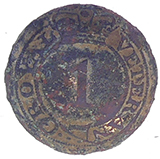 |
|
| 16thC snake buckle | Georgian bell weight | ||
c 8thC Saxon gilded mount - circule design |
|||
Unique ID: PUBLIC-AAB71E Object type certainty: Certain An incomplete medieval cast copper alloy gilded and enamelled 'Limoges' figurative mount dating c. AD 1150 - 1250. The object is anthropomorphic, depicting a robed figure. The plate forming the body is elongated and pentagonal in plan with a concave reverse and is slightly bent near the base where it terminates in a flat, angled lower edge. The head of the figure is solid; the stylised facial features are moulded with pellet eyes, arched brows and long nose with full lips. At the crown the head is flat and angled, sloping to the back with a pointed oval cross-section. It is worn but appears tonsured with feint vertical grooves at the back of the head representing hair. The narrow neck has a D-shaped cross-section and narrows from the jaw widening again to the sloping shoulders. A draped robe passes over each shoulder and the right arm appears bent upwards to the chest. The drapery on the main plate is defined with multiple asymmetrical cells for champlevé enamel inlay and traces of of red and blue enamel survive in a couple of recesses. There are also traces of gilding on the raised rims of the cells on the upper body. There are two circular perforations for rivets at centre of the top and bottom of the plate. The metal surface of the object has a dark brown patina.
Beauty medieval gilded and enamelled mount - red blue and gold remains A Romanesque enamel mount depicting a saint - of the type produced in the Limoges area in Central France during the 12th and 13th centuries. Mounts like this were typically attached to a reliquary or religious book. The mount is sub-rectangular, convex at the front and hollowed at the rear. It depicts the head and upper body of a robed male figure - probably a saint. The head projects from the top of the rectangular body and is moulded in the round with a stylised mouth and nose. There are two small recesses for the eyes, filled with blue enamel. The top of the head is flattened and angled with a slight scar, possibly from the attachment of a missing halo. a stylised mouth and nose. The neck is long and oval in cross section. It joins to sloping shoulders at the top of the body. At the base of the left side of the body there is an angled recess where the right arm of the figure is depicted as bent upwards to the chest. The forearm and hand are detailed in a reserve of metal with linear recesses around (filled with degraded enamel). The hand appears to be raised in benediction. The left arm is a simple reserve of metal along the right side of the body with a recess alongside filled with blue enamel. Over the rest if the body are several linear recesses in-filled with blue enamel and depicting the folds of the robe. Towards the centre of the chest and set in a diagonal across it are two angular recesses filled with red enamel. It is possible that these represent an item of clothing or an object associated with the saint, but is not clear which. There are two large circular attachment holes through the body, set on the longitudinal axis. The rear is hollowed and undecorated
|
|||
 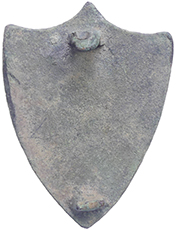 |
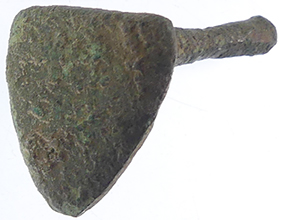 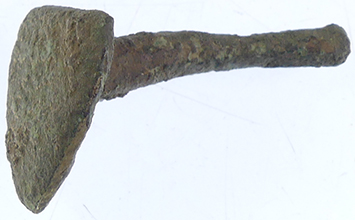 |
||
| 18thC large three cannon Royal Artillery badge | Medieval heraldic shield mount | ||
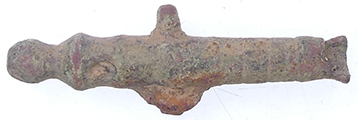 |
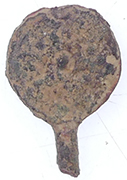 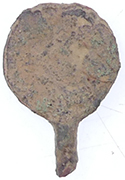 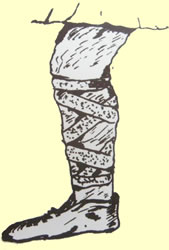 |
||
| 18thC toy cannon | C8thC Saxon hooked fastener | ||
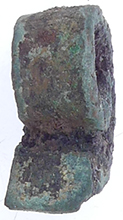 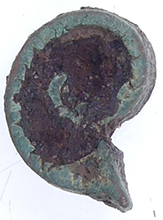 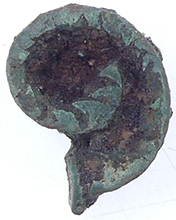 |
|||
| Interesting Roman brooch ? | |||
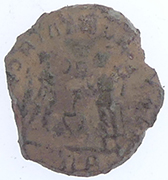 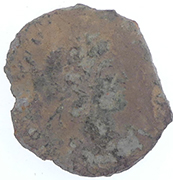 |
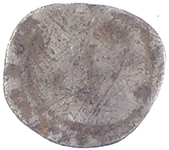 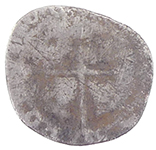 |
||
| Mid 4thC House of Constantine Roman bronze coin - 2 soldiers standing | 16thC Elizabeth 1st hammered silver penny | ||
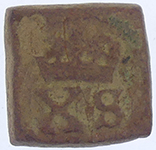 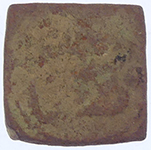 |
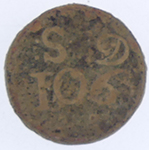 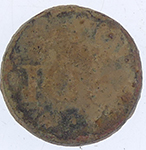 |
||
1625 Charles 1st 10 shilling coin weight Obv Crown XS |
1770's gold half guinea coin weight - 10 shillings and 6 pence Obv S10 6D |
||
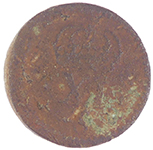 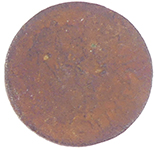 |
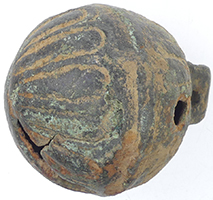 |
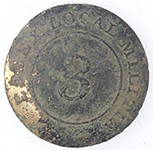 |
|
| 1612 James 1st gold angel coin weigth - 11shillings - Crown XIs | 18thC crotal bell | 3rd Essex Local Militia
'3rd Essex Local Militia gilt (b/m: Charles Jennens. London).
This is the 3rd Reg't of the Essex Local Militia. Tim' Description: 3 within circle surrounded by ESSEX LOCAL MILITIA Category: Local Militia; Type of button: Slightly convex; Metal: Copper Alloy, gilded; Backmark: S FIRMIN STRAND; Date: 1809-1816 |
|
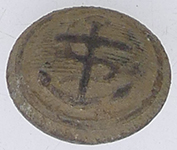 |
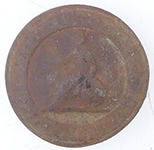 |
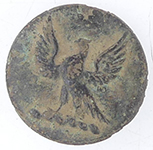 |
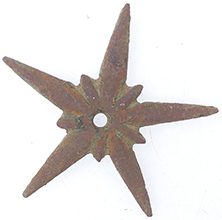 |
| RN Capt / Commander - 1787 RN Lieutenant - 1787 |
Victorian corporation button | 19thC livery button | Medieval spur rowel |
 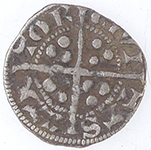 |
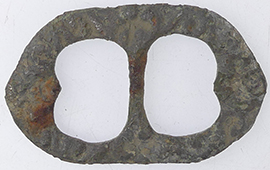 |
||
1300 -1307 Edward II hammered silver penny - Class 10 Obv +EDWAR ANGL DNS hYB Rev CIVIT/TAS/CAN/TOR - Canterbury mint
|
1500-1700 buckle | ||
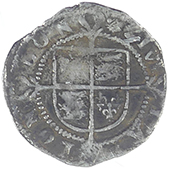 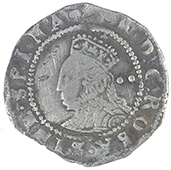 |
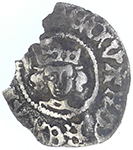 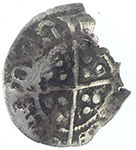 |
||
| 1584 - 1586 Elizabeth 1st hammered silver half groat - scallop mint mark |
1461-4 Edward IV hammered silver penny- Obv +EDWARD' REX AN*** Rev CIVI/TAS/LON/DON - London mint
|
||
1000 BC Bronze Age awl 45.8mm L x 11.6mm W x 6.88 mm H 13.9g Bronze Age awls comprise a range of small rod-like tools that are usually round or rectangular in cross-section and pointed at one end with a square or chiselled edge at the other. They were probably used for perforating leather, wood and bone working and other crafts. Early researchers suggested they may have been used for tattooing human skin. |
|||
 |
|||
